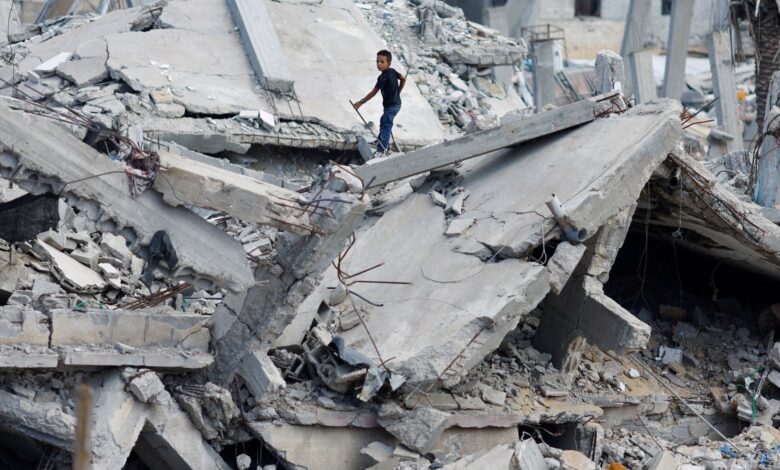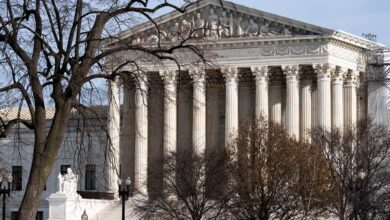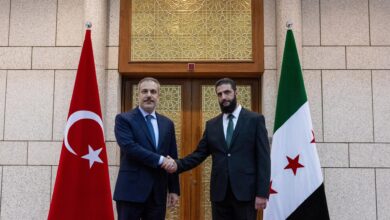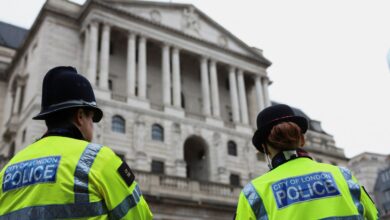I am living my own Nakba | Opinions

My grandfather Hamdi was only eight years old when his family fled Beersheba, a town in southern Palestine that was once known for its fertile land and agricultural life. His father, Abdul Raouf, was a farmer who owned approximately 1,000 dunums of land, grew wheat and sold the crop to merchants in Gaza. The family lived a happy and comfortable life.
In October 1948, several months after European Zionist forces declared the establishment of Israel, Israeli forces attacked Beersheba, forcing thousands of Palestinians, including my grandfather’s family, to flee under threat of massacre.
My grandfather often told me: “We fled Beersheba when the militias arrived.” “My father thought it would only be temporary. We left our house, our land and our animals behind, thinking we would come back. But it never happened.”
Hamdi’s family fled on foot and in a horse-drawn cart. What they thought would be a few weeks of displacement turned into permanent exile. Like 700,000 other Palestinians, they were survivors of what we now call the Nakba.
Hamdi’s family found refuge in Gaza, staying in temporary shelters and with their extended families. Their relatives helped them buy a small plot of land in the Al-Tuffah neighborhood in Gaza, just 70 kilometers (40 miles) from their home in Beersheba, which the Israelis renamed to Beersheba. Hamdi’s family struggled to rebuild their lives.
Seventy-five years after my grandfather’s experience of traumatic displacement, grief and struggle for survival, my family and I also fell victim to the Nakba.
At 4 a.m. on October 13, 2023, my mother’s phone rang. We were all sleeping in one room in our house in the Al-Rimal neighborhood in Gaza City, trying to find comfort from the sounds of drones and warplanes flying above us. The phone woke us all up.
It was a pre-recorded message from the Israeli army warning us that our house was in a danger zone and that we were receiving orders to move south. Fear gripped us as we ran outside, only to see Israeli leaflets scattered everywhere bearing the same warning. We had no choice but to pack some clothes and some bedding and flee.
This wasn’t the first time we had to leave our home. Since I was 12 years old, I have lived the horror of the Israeli attacks on Gaza, which repeatedly forced us to flee and live in fear and uncertainty.
Since I was 12 years old, I have learned to recognize the distinctive sounds of bombs, F-16s, Apache helicopters and drones. I have known firsthand the terror they bring.
Previous displacements had been temporary, and we hoped this one too would be temporary – just as my grandfather believed his family would eventually return.
But there is no return in sight now. Our house was severely damaged by an Israeli tank. The upstairs burned down, and an entire wall downstairs was lost. All our belongings were destroyed.
The handbag containing some clothes that I took on October 13th is all that remains of my possessions.
We went to the town of Al-Zawaida, in the middle of the Gaza Strip, to stay with our relatives. Along the way, we saw thousands of other Palestinians dragging bags of clothes and searching for safety.
From our temporary shelter, I saw the pain of exile in the crowded corners of every room. We shared the apartment with 47 other people, and were overwhelmed by the terrifying fear that there was no safe place. We spent two months in that crowded apartment, close to Salah al-Din Street. Eventually, the constant explosions forced us to move to another house in the area.
On January 5, sniper fire and bullets intensified. Then came the loud explosion of artillery and bombs. We gathered what little we had and fled to Deir al-Balah.
We had to live in an eight-person tent for three months before moving to a small, poorly insulated room on a friend’s plot of land. This is where we spend the winter. Rain seeps through the nylon windows, and the cold is unbearable, leaving us sleepless most nights.
We struggled to secure the most basic needs – food and water. For the past two days, we have had to survive on polluted water and a single loaf of bread. Hunger has sapped our strength and hopes.
I now understand the 1948 Nakba in a way that I did not understand before. It is a story my ancestors repeat in our generation, but within the borders of Gaza. To be honest, it seems even worse than the Nakba of 1948. The weapons used today are far more advanced, and are causing unprecedented destruction, deaths and mass casualties – something my grandparents could never have imagined in 1948.
The pain is not just physical. It’s also psychological. Witnessing the unthinkable – constant fear, loss of loved ones, struggle to survive – has taken a devastating toll. On sleepless nights, we are haunted by the deafening roar of missiles and memories of torn bodies and destroyed homes. I look at my family members and see how much their faces have changed; Their hollow eyes and silent tears speak volumes. When I walk down the street, I see communities known for their generosity and solidarity shattered by loss and devastation.
It is clear that Israel’s goal is to remove the Palestinians from historical Palestine by any means. The fear of expulsion from Gaza is great. With homes reduced to rubble and entire neighborhoods wiped out, it seems our exile may be imminent. I never imagined leaving my home, but after losing everything, Gaza is no longer a place to live – just a graveyard of despair and loss.
There is no Palestinian who has not been affected by displacement and the fear of losing the homeland forever. The Nakba is truly the never-ending story of Palestine.
The opinions expressed in this article are those of the author and do not necessarily reflect the editorial position of Al Jazeera.
https://www.aljazeera.com/wp-content/uploads/2024/12/2024-12-17T221539Z_1325617453_RC2JFAAENC5F_RTRMADP_3_ISRAEL-PALESTINIANS-USA-LAWSUIT-1734507380.jpg?resize=1920%2C1440
2024-12-22 10:54:00





